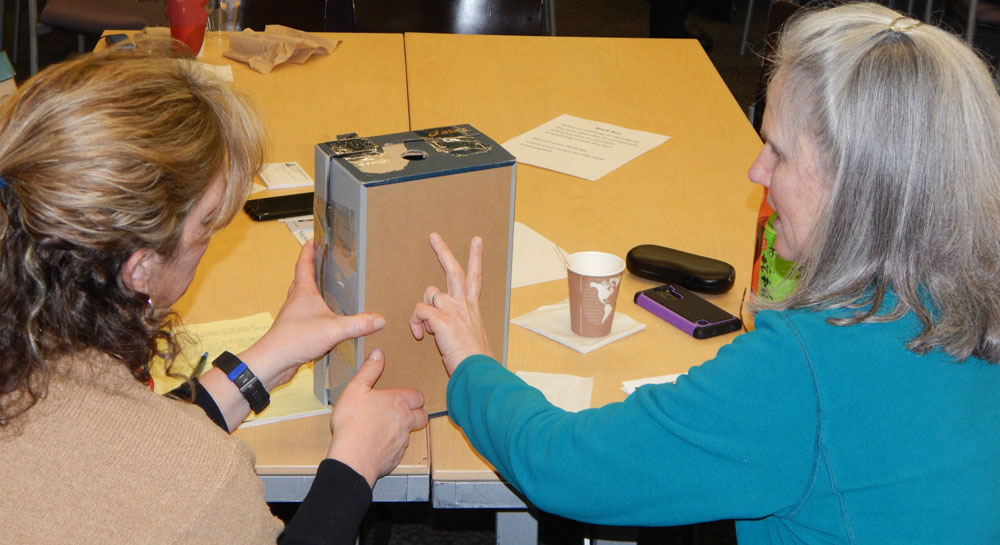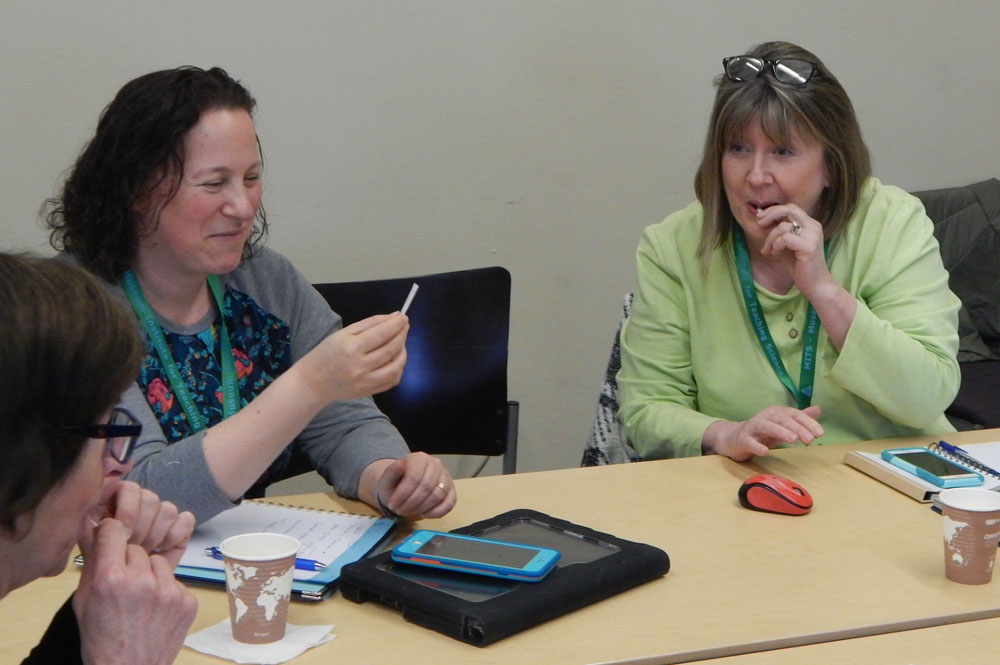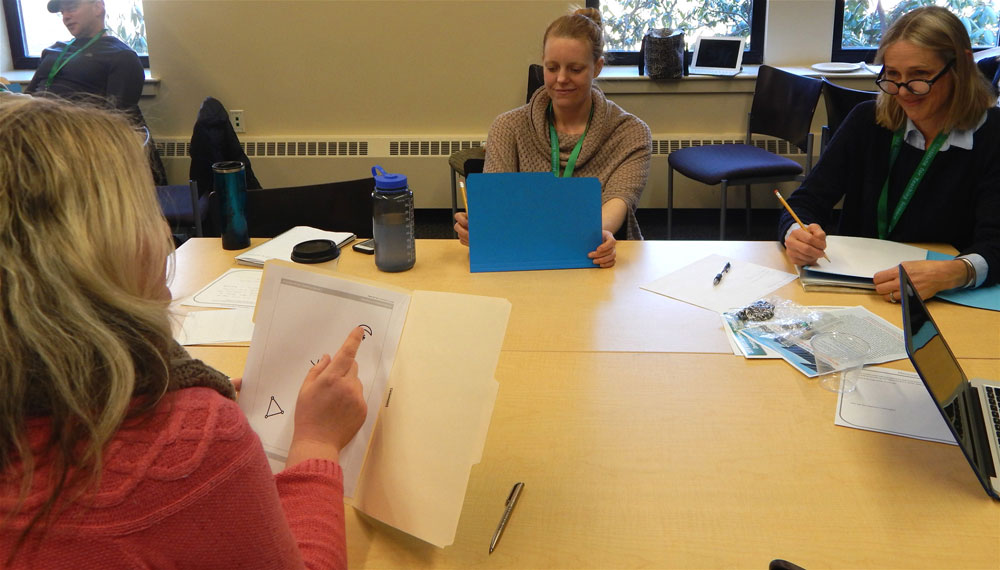Thursday, March 1, 2018
For Immediate Release
At MITS February Professional Development Seminar,
Educators Get a Taste for Communicating Science
Worcester, MA – Thirty educators got a taste of inquiry-based, hands-on learning at the Museum Institute for Teaching Science (MITS) February 14, 2018 Professional Development Seminar. Geared towards informal educators, the seminar showcased The Discovery Museum’s Science & Engineering Communication Fellowship program as a model for communicating current research findings through public programs at informal education institutions, like museums and nature centers.
All Hands in for Hands-on Learning
How can real-life science be transformed into exciting, inquiry-based lessons? Educators considered this question during the two seminar sessions on Valentine’s Day. They reviewed the molecular biology behind humans’ sense of taste with Dr. Lindsay Mehrmanesh, Biology Teaching Lab Supervisor at Brandeis University and former Science & Engineering Communication Fellow at The Discovery Museum. To reinforce their learning, participants examined their abilities to taste the bitter chemical phenylthiocarbamide (PTC) in an activity developed by Dr. Mehrmanesh during her fellowship. Individuals’ reactions to the bitter chemical varied due to differences in their molecular makeup; some people have the gene to taste PTC while others do not. Afterward, Dr. Mehrmanesh described how she designed hands-on activities to communicate her science findings to the public, and connected participants with helpful resources they can use to do the same.
The afternoon session featured presenters Denise LeBlanc, Director of Learning Experiences and Elizabeth Leahey, Assistant Director of Learning Experiences from The Discovery Museum. Using the museum’s Science & Engineering Communication Fellowship program as a model, participants considered how they can work with scientists and engineers to facilitate effective communication strategies and develop hands-on activities, like Dr. Mehrmanesh’s, to share current research with the public. They tried out some of The Discovery Museum’s activities, and engaged in the Science and Engineering Practices by investigating and describing the contents of sealed boxes and by replicating images without seeing the originals. During these inquiry-based, hands-on activities, participants explored strategies for helping scientists to clearly communicate their research to the public and create curricula that is accessible to a variety of learners.
About the Presenters
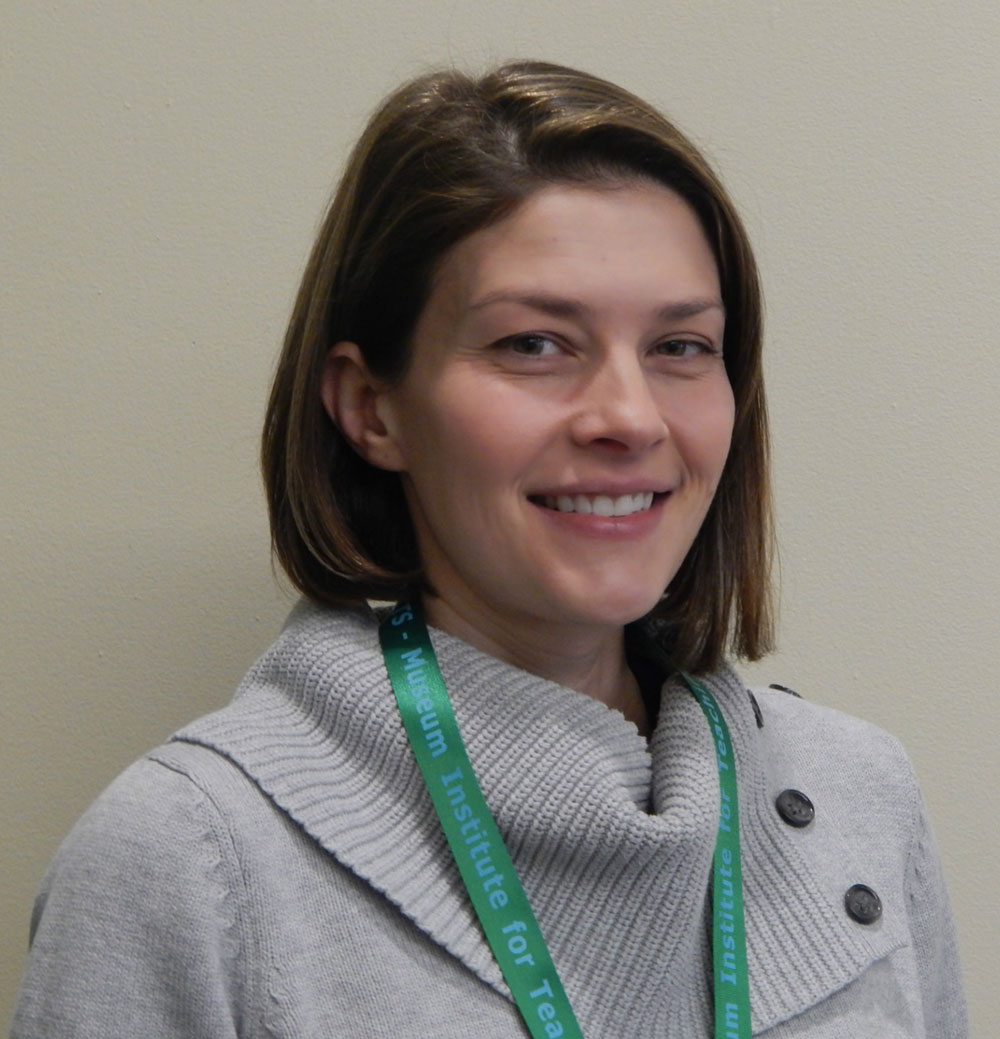 Dr. Lindsay Mehrmanesh earned her Bachelor of Science degree in Biochemistry from University of Massachusetts, Amherst and her PhD in molecular Biology from Brown University. While at Brown, she studied TAF4b, a transcription factor involved in mammalian fertility. Dr. Mehrmanesh now designs and teaches pre-college lab intensive summer classes for high school students at Brown and coordinates the undergraduate biology teaching labs at Brandeis during the academic year. Her goal is to cultivate independent, scientific thinking and love for discovery in learners through engagement in project-based experiments that require current research techniques.
Dr. Lindsay Mehrmanesh earned her Bachelor of Science degree in Biochemistry from University of Massachusetts, Amherst and her PhD in molecular Biology from Brown University. While at Brown, she studied TAF4b, a transcription factor involved in mammalian fertility. Dr. Mehrmanesh now designs and teaches pre-college lab intensive summer classes for high school students at Brown and coordinates the undergraduate biology teaching labs at Brandeis during the academic year. Her goal is to cultivate independent, scientific thinking and love for discovery in learners through engagement in project-based experiments that require current research techniques.
After graduating from University of New Hampshire, Denise LeBlanc worked for 14 years as a researcher and 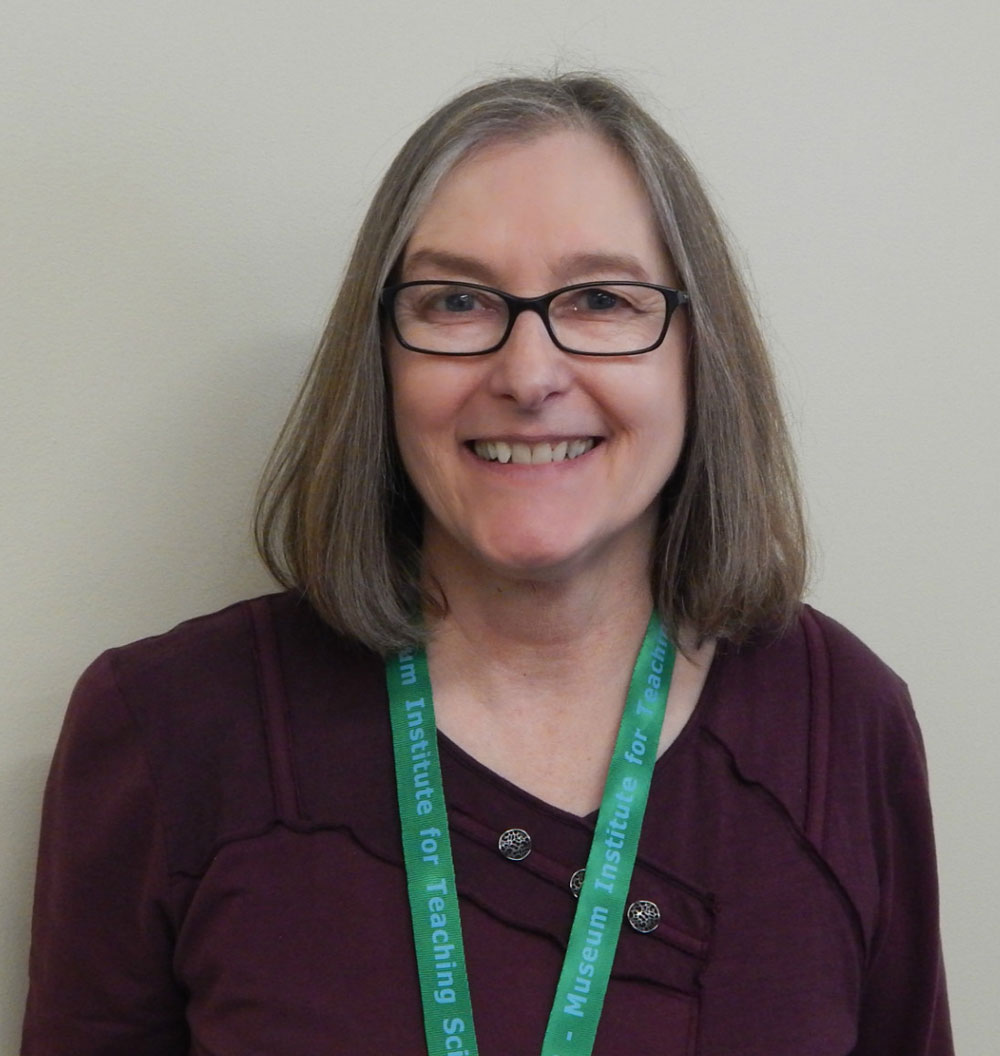 biochemist in labs at Dartmouth College and Brandeis University. For over 25 years, she has been applying her science background to her role as a science educator at The Discovery Museum in Acton, MA. In her present position as Director of Learning Experiences, Denise develops interactive programs and exhibits, directs grant projects, and coordinates university collaborations, including the Science & Engineering Communication Fellowship program.
biochemist in labs at Dartmouth College and Brandeis University. For over 25 years, she has been applying her science background to her role as a science educator at The Discovery Museum in Acton, MA. In her present position as Director of Learning Experiences, Denise develops interactive programs and exhibits, directs grant projects, and coordinates university collaborations, including the Science & Engineering Communication Fellowship program.
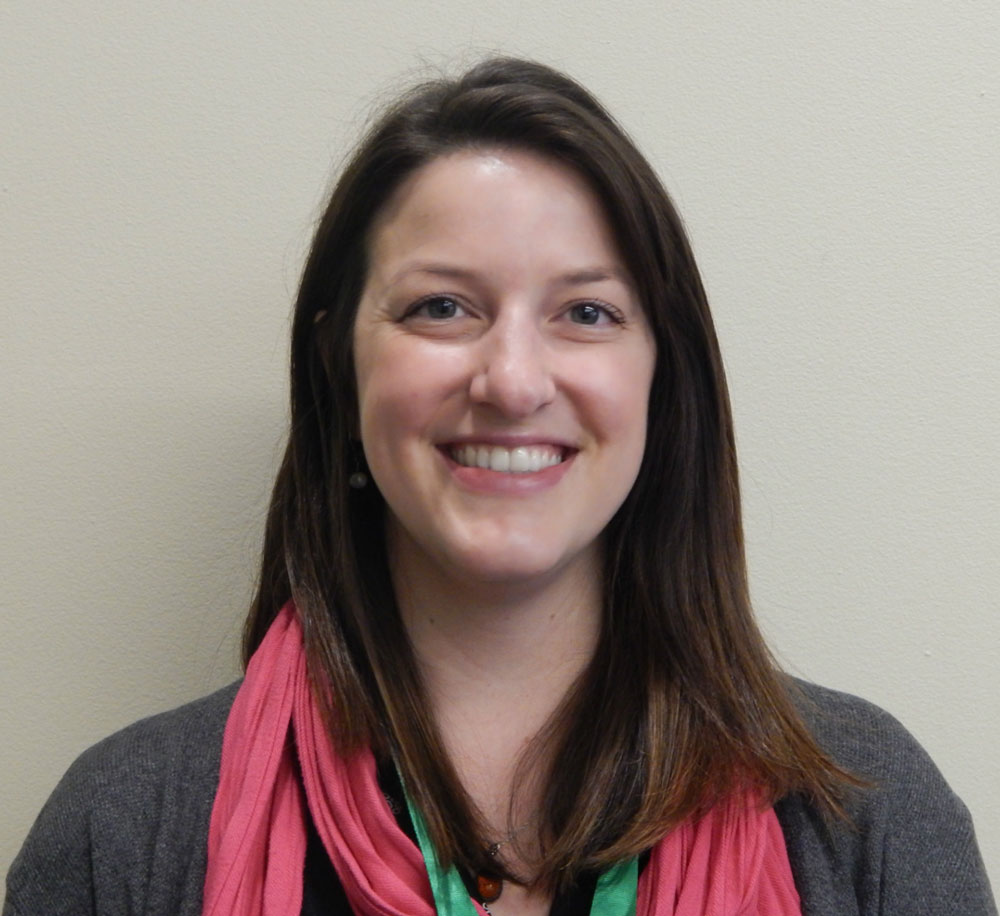 Elizabeth Leahey, Assistant Director of Learning Experiences at The Discovery Museum, earned her Bachelor of Science degree from Villanova University and her Master of Arts from Tufts University. At The Discovery Museum, Elizabeth designs and facilitates hands-on science, engineering and art-based activities for visitors of all ages, and assists with exhibit development and delivering professional development workshops, including the museum’s Science & Engineering Communication Fellowship program.
Elizabeth Leahey, Assistant Director of Learning Experiences at The Discovery Museum, earned her Bachelor of Science degree from Villanova University and her Master of Arts from Tufts University. At The Discovery Museum, Elizabeth designs and facilitates hands-on science, engineering and art-based activities for visitors of all ages, and assists with exhibit development and delivering professional development workshops, including the museum’s Science & Engineering Communication Fellowship program.
MITS Professional Development Seminars
MITS 2018 Professional Development Seminar Series seeks to inspire new ideas for STEM-focused school programs and exhibits by engaging informal educators in hands-on, minds-on learning and presenting both useful content and pedagogical approaches. During sessions, participants get to explore STEM activities from the viewpoint of a student, which fosters the curriculum brainstorming process. By experiencing activities first-hand, educators learn ways to more effectively engage students and visitors in The Science and Engineering Practices. More information about MITS Professional Development Seminar Series can be found at: https://www.wadeinstitutema.org/2018-professional-development-seminar-series/.
###
The Museum Institute for Teaching Science specializes in providing hands-on, minds-on, inquiry-based STEM professional development for formal and informal educators. For more information, visit www.mits.org or call 617-328-1515.

